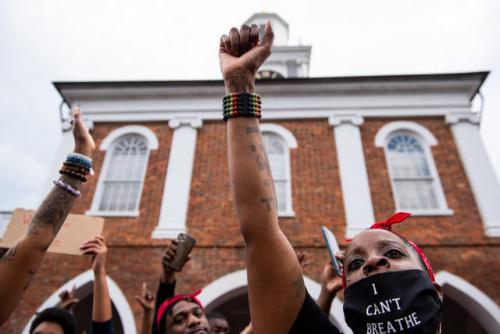African American Mayors and Sheriffs Stand Among George Floyd Protestors
- Información

Four years ago, Rakeem Jones was punched unawares by John McGraw at a Donald Trump rally in Fayetteville, North Carolina on March 8, 2016, as police looked on. Today Jones, a young black man who wears his hair in long twists, was outside in the brutal humidity of an incipient Southern summer. Exhausted and probably saving his energy for the day ahead, Jones said simply, “You can talk and you can talk, but then you got to do something.”
Hundreds had already gathered at noon, walking along Fayetteville’s main artery, Skibo Road. Despite the dripping heat, despite the threat of Covid-19 spreading in groups and gatherings, many felt compelled to make their presence felt and their voices heard after the callous murders of George Floyd, Ahmaud Aubery and Breonna Taylor at the hands of white police officers.
Walking in the crowd was Fayetteville mayor Mitch Colvin. Wearing a promotional polo shirt and plain pants, he was a nondescript member of the group, without retinue or escort. With Rakeem Jones’ help, Colvin and a coalition of other regional mayors and sheriffs quickly decided to refrain from visible police presence as they organized their towns’ participation in the mounting protests sweeping the country.
Emotions were high in Raleigh, the state capital about an hour north of Fayetteville, at 6:56pm, where the protest had already grown from 900 to 3,000. Suddenly one group of protestors let out of a collective scream and ran to join another group turning onto Salisbury Street, which had not been cleared of vehicular traffic. Still the police, barely noticeable, did not interfere, as the two groups merged in and around the honking cars and noisily returned to the march’s preordained path.
By 7:00 pm, the hour at which organizers agreed to end the gathering, Raleigh police instead emerged to shut down Raleigh’s eight lane Capital Boulevard in both directions, allowing protestors to fill the main road into the city from its northeastern suburbs.
The sheriff of Wake County, where Raleigh is located, is Gerald Baker and he explained how drones were surveying the crowds and undercover officers were present on the streets. He quickly added, “It’s not about enforcement, but safety.” Fayetteville Police Chief Gina Hawkins reiterated the sentiment, saying she instructed officers to stand down.
Durham County Police Chief Clarence E. Birkhead issued a statement in which he described how he felt when he joined the force 35 years ago, “to help diversify a profession that had few people of color, like me, in its ranks.” He also led a restrained police presence throughout today’s protest in his city, citing safety while “protecting free speech.”
“Let us be resolved to fight for justice for all here in Durham,” he wrote. “Let us commit to stand up or kneel down when injustices are identified.”
Meanwhile back in Fayetteville, Rakeem Jones was interrupted as he spoke to a reporter on Hay Street. Smoke could be seen coming out of broken second story windows in the city’s historic Market House, and Jones ran to literally put out the flames. Market House has recently been the subject of debate, with calls to remove its outline from official Fayetteville correspondence because of its ties to the slave trade. Constructed in 1832, Market House sits atop the square where African people were once sold to European colonists. A plaque reads, “In memory and honor of those indomitable people who were stripped of their dignity when sold as slaves at this place.”
May 31, 2020
Del mismo autor
- El icónico glaciar mexicano Ayoloco ya no existe 29/04/2021
- Venezuela envía oxígeno y médicos a la Amazonía brasileña 21/01/2021
- Venezuela sends oxygen and doctors to Brazilian Amazon 20/01/2021
- France grants citizenship to immigrant essential workers 06/01/2021
- La caravana de los damnificados 29/12/2020
- Honduras: Caravan of the Damned 28/12/2020
- La policía abre fuego sobre protesta contra el feminicidio en Cancún 16/11/2020
- Police Fire on Femicide Protest in Cancún 14/11/2020
- To Our Confederate Dead: Take It Down! 21/06/2020
- Police fire at queer bar owner during protests on first day of Pride 03/06/2020
